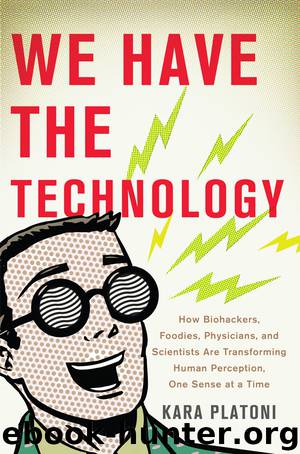We Have the Technology by Kara Platoni

Author:Kara Platoni
Language: eng
Format: epub, pdf
ISBN: 9780465073757
Publisher: Basic Books
SEVEN
Pain
THE NIGHT LIGHT is all dark wood and leather and red and gold flocked wallpaper; the bar’s time era seems set somewhere between “Gold Rush” and “impossible future.” The cash register is a vintage machine. There’s a semispooky antique wooden figurehead floating over the bar. Over the course of the evening, the bright piles of citrus fruit piled into bowls along the bar will be cranked through an extremely steampunk hand press. Behind the bar is John Nackley, bearded, wavy-haired, wiry, clad in black jeans, checked Vans sneakers and a t-shirt advertising a local skate shop. He’s the star of the show, cheerily greeting customers, mixing cocktails, making change. He and his co-owner designed the Night Light as a neighborhood lounge where everybody would feel welcome, a retro-future hideout “like if there was a bordello aboard Captain Nemo’s Nautilus,” he says. He pauses thoughtfully. “Do you remember his room with the big pipe organ? You know, it was very ornate. Really lush for a submarine.”
It’s Happy Hour, and as the Fresh Jamz deejay crew spins reggae and dub in the background, the after-work crowd at this downtown Oakland watering hole seems pretty, well, happy. But not me. I am here because I want to know about the nature of pain, specifically the pain of social rejection. And who has observed that very bitter form of pain more often than your local bartender? Nackley’s been pouring drinks up and down the West Coast for 16 years. That’s given him plenty of opportunities to hear tales of romantic woe and to dispense the occasional bit of what he insists is bad advice. “I’m no psychologist, and I’m no smarty,” he says leaning over the bar, “but I’ll tell you what, I can tell you a thing or six about broken hearts.”
And broken hearts are why I’m here. One of the most fascinating wings of pain research has to do with the question of how the brain processes physical pain, or the pain of a broken bone, versus social pain, or the pain of a broken heart. Led by researchers like Dr. Naomi Eisenberger, a social psychologist at UC Los Angeles, some researchers argue that these processes are astonishingly similar. As with the taste researchers, one of their clues is language, because so many people use physical terms like feeling crushed, bruised, or heartsick to describe rejection. But taste and pain researchers are essentially contemplating inverse arguments: While the food science folks are debating whether we could perceive a new taste if we established a discrete word and conceptual category for it, pain scientists are wondering whether two experiences we perceive as categorically separate are in fact neurally the same. In other words, instead of thinking about splitting off new perceptual categories, they are wondering if we should collapse them. “It seems to be a universal phenomenon that people describe these negative experiences associated with breaking social bonds as being hurtful,” Eisenberger says. “This is sort of intriguing, and led us to wonder
Download
This site does not store any files on its server. We only index and link to content provided by other sites. Please contact the content providers to delete copyright contents if any and email us, we'll remove relevant links or contents immediately.
| Biochemistry | Biomedical Engineering |
| Biotechnology |
Whiskies Galore by Ian Buxton(41967)
Introduction to Aircraft Design (Cambridge Aerospace Series) by John P. Fielding(33106)
Small Unmanned Fixed-wing Aircraft Design by Andrew J. Keane Andras Sobester James P. Scanlan & András Sóbester & James P. Scanlan(32779)
Craft Beer for the Homebrewer by Michael Agnew(18218)
Turbulence by E. J. Noyes(8007)
The Complete Stick Figure Physics Tutorials by Allen Sarah(7352)
Kaplan MCAT General Chemistry Review by Kaplan(6916)
The Thirst by Nesbo Jo(6909)
Bad Blood by John Carreyrou(6601)
Modelling of Convective Heat and Mass Transfer in Rotating Flows by Igor V. Shevchuk(6421)
Learning SQL by Alan Beaulieu(6264)
Weapons of Math Destruction by Cathy O'Neil(6248)
Man-made Catastrophes and Risk Information Concealment by Dmitry Chernov & Didier Sornette(5981)
Digital Minimalism by Cal Newport;(5740)
Life 3.0: Being Human in the Age of Artificial Intelligence by Tegmark Max(5534)
iGen by Jean M. Twenge(5398)
Secrets of Antigravity Propulsion: Tesla, UFOs, and Classified Aerospace Technology by Ph.D. Paul A. Laviolette(5358)
Design of Trajectory Optimization Approach for Space Maneuver Vehicle Skip Entry Problems by Runqi Chai & Al Savvaris & Antonios Tsourdos & Senchun Chai(5055)
Pale Blue Dot by Carl Sagan(4984)
